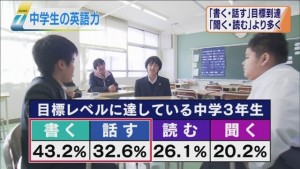curriculum extensive listening extensive reading public policy
by sendaiben
4 comments
English Skills of Japanese Students
Business as Usual
Japan Times article. NHK puts a positive spin on the data. Less positive commentary.
Apart from unsurprised disappointment, my first reaction is to question what exactly the government thinks the equivalent of Eiken 3, pre-2, or 2 writing skills are that 40-odd percent of students have (given that these tests don’t have a writing section).
Is it that ridiculous ‘rearrange these words in the right order’ section? Because if they were using the words ‘writing skills’ in the form that the rest of the world understands, I think it would be a struggle for any Japanese junior and senior high school students to demonstrate proficiency.
I wrote about English education in Japan a couple of years ago in my ‘if I ruled the world’ series:
I don’t think a huge amount has changed since I wrote those. One thing that has changed for me is seeing how effective an extensive reading and listening course is. I will be doubling my efforts to get local schools to start their own programs -wish me luck.
It’s really difficult to work out how well the school programs are working. I’d suspect that many of the kids meeting the benchmarks also studied English at conversation school or cram school, or went to a bi-lingual kinder, and the ones not meeting the benchmarks perhaps didn’t go to an English school. I teach full-time at an elementary school, grades 1-6 (over 500 students). The abilities of my students vary greatly, some of this variation is due to the way they approach my class, but a lot of it is just due to their English experience outside of class. There are bi-lingual kids studying with kids with no English experience.

Nice to know I still have a job. They are not doing theirs, so people pay me for that. Still, I share your desire to bring Japanese kids in line with other countries like China and South Korea. Why should Japan be missing the boat here?